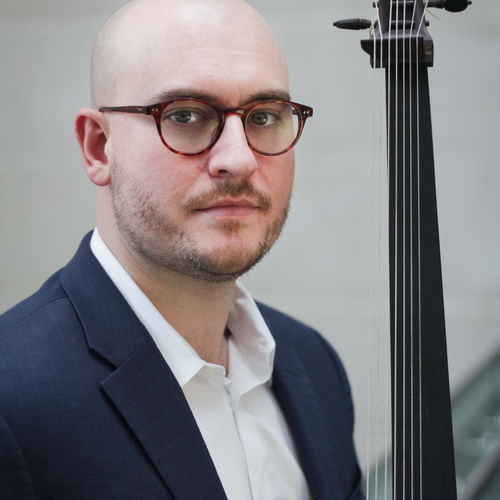Fourteen and Six
Details
Andrew Flory full profile / Solo Theorbo and Solo Classical Guitar / 1 musician
Full program notes
This program features solo works for theorbo and classical guitar. The title “Fourteen & Six” is in reference to the fourteen strings of the theorbo and the six strings of the classical guitar.
The theorbo is the largest of the lute family of instruments and was developed in the very late 16th century in Florence, Italy. A behemoth in size and sound, the theorbo quickly gained popularity as an accompaniment instrument where it excelled in playing continuo in the earliest of operas and for chamber groups and solo voice. Throughout the entirety of the baroque era, the theorbo flourished in its accompanying role but a mere sliver of solo works for the instrument survive when compared to what can be played on the instrument for accompanying purposes. However, there are three composers that stand out in their quality of solo music for the instrument and in the amount of their solo theorbo works that survive. Those three composers are Alessandro Piccinini (1566-1638), Giovanni Girolamo Kapsberger (1580-1651), and Robert de Visée (1655-1732/1733) and they are featured in today’s program.
The guitar works in this program feature the Viennese Romantic composer Johann Kaspar Mertz and two contemporary composers, Olga Amelkina-Vera and Phillip Houghton. Variations mignonnes by Mertz is from his Bardenklänge, Op. 13 which was a collection of pieces based on folk and popular songs of 19th century Vienna. This collection is also his largest collection of works.
Western Vista by Olga Amelkina-Vera is a beautiful portrayal of the American West and the larger than life image of the 19th century cowboy. In it’s bittersweet opening movement, we hear the tune of the famous cowboy song “Bury Me Not On The Lone Prairie”. This is followed by a rousing second movement based on the idea of a cowboy riding a bucking bronco.
The final work in this program is OPHELIA...a haunted sonata by the late Australian composer Phillip Houghton. This piece is centered around the tragic Shakespearean character Ophelia from the play Hamlet. Her descent into madness and her untimely death is outlined in the titles of the movements of the piece. Musically, Houghton employs an altered tuning of the guitar to create a dark sonority that complements the somber nature of the piece. I find this piece to be one of my favorites to perform as it is incredibly captivating and unrelentingly pulls at one’s heartstrings.
Historical context
See full program notes.
Videos from this player
Other programs from this ensemble

 Continue with Facebook
Continue with Facebook
 Continue with Google
Continue with Google
 Continue with Apple
Continue with Apple
